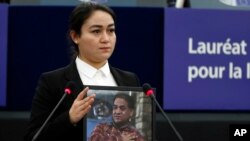This week marks 10 years since Ilham Tohti, a 54-year-old Uyghur economist and human rights advocate, was sentenced to life in prison by Chinese authorities.
For some, like Enver Can, a 75-year-old German-based Uyghur rights activist who leads an organization advocating for Tohti's release, the fight for his release continues to this day.
"South Africa had Nelson Mandela, India had Mahatma Gandhi, and we Uyghurs have Ilham Tohti," Can tells VOA.
Tohti, a former professor at Minzu University in Beijing, was sentenced to life imprisonment in September 2014 on charges of separatism. He is widely recognized for promoting dialogue between Uyghurs and Han Chinese. In 2019, he was awarded the Sakharov Prize for Freedom of Thought by the European Parliament.
Like Tohti, Can was born in the Xinjiang Uyghur Autonomous Region where the Uyghur remains imprisoned. At the age of 12, Can fled Xinjiang with his family. In the 1970s, he moved to Germany and worked as a journalist for Radio Free Europe/Radio Liberty until the early 1990s.
In 2016, two years after Tohti's life sentence, Can founded the "Ilham Tohti Initiative" to campaign for his release. Earlier this month, Can was particularly busy meeting European parliamentarians and other groups to push for Tohti's release from Chinese detention.
"To my knowledge, Ilham Tohti is one of the very few Uyghurs who dared to speak up for Uyghur rights while living under the Chinese regime. He articulated his demands eloquently and clearly, framing them within both international norms and Chinese law," Can told VOA in a phone interview.
EU pressure continues
In a statement released on Monday, the European Union reiterated its call for the "immediate and unconditional release" of Ilham Tohti and other human rights defenders, lawyers, and intellectuals "arbitrarily detained" in China.
"The imprisonment of Ilham Tohti is representative of the deeply worrying human rights situation in Xinjiang," the EU said, citing reports from U.N. bodies and the 2022 assessment by the U.N. Human Rights Office.
Since Tohti's arrest in 2014, concerns about human rights abuses in Xinjiang have worsened with significant attention drawn to the issue around the beginning of 2017, when reports of mass detentions of Uyghurs and other Muslim minorities in the region started to emerge.
Advocacy organizations such as Amnesty International and Human Rights Watch have been vocal about the situation in Xinjiang, with notable reports and statements escalating around 2018.
In particular, the U.N. Human Rights Office has issued assessments and reports highlighting the situation, including a U.N. rights report released in August 2022 that detailed human rights violations in Xinjiang. China's response has consistently been to deny these allegations, labeling them as part of a Western agenda to undermine its sovereignty and stability in the region.
Can told VOA that the time for mere statements is over.
"Just calling for Ilham Tohti's release is not enough," he said. "There have been countless petitions and open letters over the past decade. We need concrete actions."
Can urged tougher measures against China, including sanctions on officials, visa restrictions, and re-negotiating trade terms.
China's defense
In an email to VOA, Liu Pengyu, spokesperson for the Chinese Embassy in Washington, defended the sentencing of Ilham Tohti, asserting that he is guilty of "splitting the country" and that the evidence against him is "conclusive."
"As a teacher, Ilham Tohti once publicly called terrorist extremists 'heroes', incited, lured and coerced some people to go abroad to participate in the activities of the 'East Turkestan' separatist forces, and planned, organized and carried out a series of criminal activities to split the country," Liu said.
He insisted that China's judicial system acted strictly in accordance with Chinese law and that "China's internal affairs and judicial sovereignty must not be interfered with."
Jewher Ilham, the daughter of Ilham Tohti and a human rights activist in the U.S., disputed the Chinese government's portrayal of her father's case, asserting that his imprisonment resulted from his peaceful advocacy for marginalized Uyghurs rather than any legal violations.
"A normal and healthy society allows for more than one voice or opinion," Ilham told VOA. "The Chinese government did not tolerate different opinions 10 years ago, and it is clear they still do not."
Family's heartbreak
Jewher Ilham last saw her father on February 2, 2013, in a Beijing airport interrogation room, where they shared their final goodbye. During that encounter, Ilham urged her to leave China for the U.S., despite the presence of Chinese authorities.
"Look at them, look at how they treat you and me. Do you still want to stay in this country? I would rather you sweep the streets in America than be treated like this here," Ilham recalled her father's words.
At the time, Ilham Tohti was prevented from departing for a year-long visiting scholar position at Indiana University, and those parting words continue to resonate with his daughter to this day.
After 11 months of house arrest, Chinese authorities arrested Tohti on January 15, 2014, while Jewher was in the United States.
"On January 15, 2014, over 20 police officers came to arrest my father. My youngest brother was three-and-a-half years old, and the oldest was seven. They were napping when the police broke in and aggressively took him away," Ilham told VOA in a phone interview. She kept in touch with her family and friends until early 2017, and that's how she learned what had happened.
"My stepmother wasn't home because she was working away. My grandmother found out about my father's arrest later, and she became very sick. I recently heard that my grandmother passed away two years ago," she said.
Eight months later, on September 23, 2014, Chinese authorities sentenced Tohti to life imprisonment on alleged charges of "splitting the country."
"September 23 is a devastating date for my family. My father Ilham Tohti was sentenced to life on this date 10 years ago," Jewher told VOA. "Just like my father never stopped advocating for the voiceless, I will not stop, no matter what."




